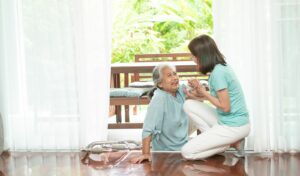How 24-Hour Home Care Enhances Safety for Seniors Living Alone
24-hour home care helps seniors stay safe, independent, and supported at home by reducing fall risks, managing medications, and providing…
Falling is one of the largest concerns for the elderly population. We see it on the news when elderly celebrities fall, and it can make your loved one nervous and scared about falling. As a caregiver, it can also give you concern as your loved one is living independently, especially if they live alone. You might worry that a fall will happen and they won’t be able to call for help. Having a home care assistance provider visit regularly can help address some concerning issues.
While a fall can happen to anyone at any time, there are certain factors you can look for the next time you’re with your loved one to see that might indicate a fall is more likely to occur. The good news is that many of these risk factors can be addressed so you can then reduce the risk of your loved one falling when you’re not around.

Home Care Assistance Tower Road FL – Risk Factors that Lead to Falls
As your loved one ages, her vision may get worse. Cataracts are common as well as thickening corneas, making light more difficult to reach the retina. That means what may seem light enough to you or her home care assistance team, may not be enough light for your loved one. Without good vision, your loved one may not see that dark shoe on the floor and trip over it.
To prevent falls due to poor vision, there are two main steps. First, have your loved one’s eyes checked regularly so her prescription is correct, and look for concerns such as cataracts. Second, increase the lighting in her home, especially in those dark areas like stairwells and corners. Nightlights might help as well as brighter light bulbs.
Some medications cause dizziness or lightheadedness, especially when standing too quickly. They might also lead to dehydration, which could lead to lightheadedness and then a tumble when she tries to walk.
To help your loved one combat this dangerous side effect, talk to her doctor about the best way for her to take her medication as well as possibly switching it if it’s particularly bothersome. Your loved one will need to learn to change positions more slowly, giving her body time to adjust to change so that she’s not immediately dizzy.
We talked about lighting before, but are there other areas of her home that may lead to tripping? Loose rugs, uneven floors or steps, and just clutter can all lead to tripping hazards.
Having a home care assistance provider visit regularly to clean and pick up may be one way to keep the clutter at bay. You might also want to look at securing anything on the floor that might cause your loved one to stumble.
As the elderly become less active, there is an increase in the loss of balance, flexibility, and coordination, making it more difficult to recover when tripping over something.
Keep your loved one active by having her take daily walks or go to the local senior center with her home care assistance provider for swimming or pickleball. Whatever activity keeps her moving is more likely to prevent her from falling than sitting in a chair all day.
24-hour home care helps seniors stay safe, independent, and supported at home by reducing fall risks, managing medications, and providing…
In-home care helps seniors stay safe, comfortable, and independent at home. Touching Hearts at Home Gainesville offers personalized support for…
With the help of home care assistance, seniors can adopt anti-inflammatory lifestyle choices as those listed here and be encouraged…
The great news about cherries is that they are considered a superfood because of the many multiple ways eating a…
Having home care by their side helps seniors better manage their diabetes in a number of ways, as discussed here,…
As the holiday season fills the air with joy and gratitude, we want to take a moment to thank you…
We are beyond thrilled and blessed to announce that 𝙏𝙤𝙪𝙘𝙝𝙞𝙣𝙜 𝙃𝙚𝙖𝙧𝙩𝙨 𝙖𝙩 𝙃𝙤𝙢𝙚 𝙝𝙖𝙨 𝙗𝙚𝙚𝙣 𝙣𝙖𝙢𝙚𝙙 𝙩𝙝𝙚 𝘽𝙚𝙨𝙩 𝙃𝙤𝙢𝙚 𝘾𝙖𝙧𝙚…
Touching Hearts at Home Caregiver was recognized nationally as a Caregiver Champion Award winner. We couldn’t be more proud of…
Tammy was awarded an additional two awards at the Touching Hearts at Home Annual Caregiver Awards Ceremony -- first, the…